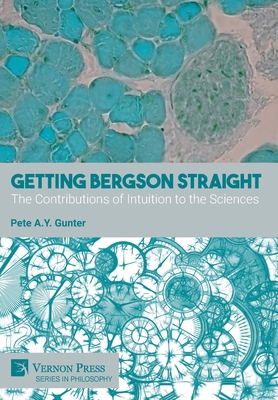Getting Bergson Straight: The Contributions of Intuition to the Sciences

Getting Bergson Straight: The Contributions of Intuition to the Sciences
This study concerns the ideas of one particular philosopher, Henri Bergson, whose views of time, intuition, and creativity have had a significant impact on art, literature, and the humanities, both in his time and in our own. Although it is generally recognized that Bergson's ideas have significantly impacted the arts and the humanities, it has not been recognized how they have also had a creative influence on the sciences as well. Nor has it been realized that this was one of his most basic contentions. Bergson's conception of intuition-his fundamental insight into reality-was not limited to fugitive insights into human existence. By realizing previously unsuspected possibilities for research and discovery, his endeavors were also meant to make possible new advances in the sciences. If it enabled his cousin by marriage, Marcel Proust, to explore human memory in depth, it also inspired psychologists like Daniel Schachter to use Bergson's ideas to make real contributions to contemporary memory science. If his notion of creative evolution brought many thinkers to a belief in human creative freedom, it brought others (notably Alexis Carrel and Pierre Lecomte de Noüy) to a scientific study of biological time. Among his successful speculations was the theory of the Big Bang cosmology. 'Getting Bergson Straight' shows many points at which Bergson's ideas anticipated future developments in the sciences. This was seen clearly by the Nobel Prize-winning physicist Luis de Broglie who viewed Bergson's physics as presaging quantum physics. Thus, the text is well situated for arts, humanities, social science, and natural science classrooms studying creative thinking and/or intellectual history.
PRP: 537.33 Lei
Acesta este Prețul Recomandat de Producător. Prețul de vânzare al produsului este afișat mai jos.
429.86Lei
429.86Lei
537.33 LeiIndisponibil
Descrierea produsului
This study concerns the ideas of one particular philosopher, Henri Bergson, whose views of time, intuition, and creativity have had a significant impact on art, literature, and the humanities, both in his time and in our own. Although it is generally recognized that Bergson's ideas have significantly impacted the arts and the humanities, it has not been recognized how they have also had a creative influence on the sciences as well. Nor has it been realized that this was one of his most basic contentions. Bergson's conception of intuition-his fundamental insight into reality-was not limited to fugitive insights into human existence. By realizing previously unsuspected possibilities for research and discovery, his endeavors were also meant to make possible new advances in the sciences. If it enabled his cousin by marriage, Marcel Proust, to explore human memory in depth, it also inspired psychologists like Daniel Schachter to use Bergson's ideas to make real contributions to contemporary memory science. If his notion of creative evolution brought many thinkers to a belief in human creative freedom, it brought others (notably Alexis Carrel and Pierre Lecomte de Noüy) to a scientific study of biological time. Among his successful speculations was the theory of the Big Bang cosmology. 'Getting Bergson Straight' shows many points at which Bergson's ideas anticipated future developments in the sciences. This was seen clearly by the Nobel Prize-winning physicist Luis de Broglie who viewed Bergson's physics as presaging quantum physics. Thus, the text is well situated for arts, humanities, social science, and natural science classrooms studying creative thinking and/or intellectual history.
Detaliile produsului









